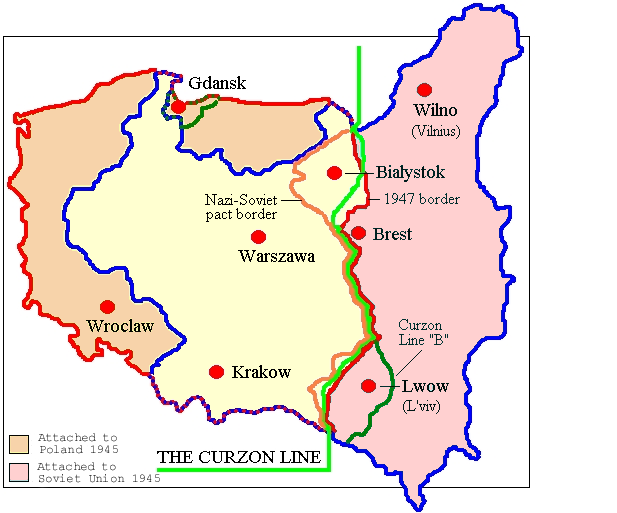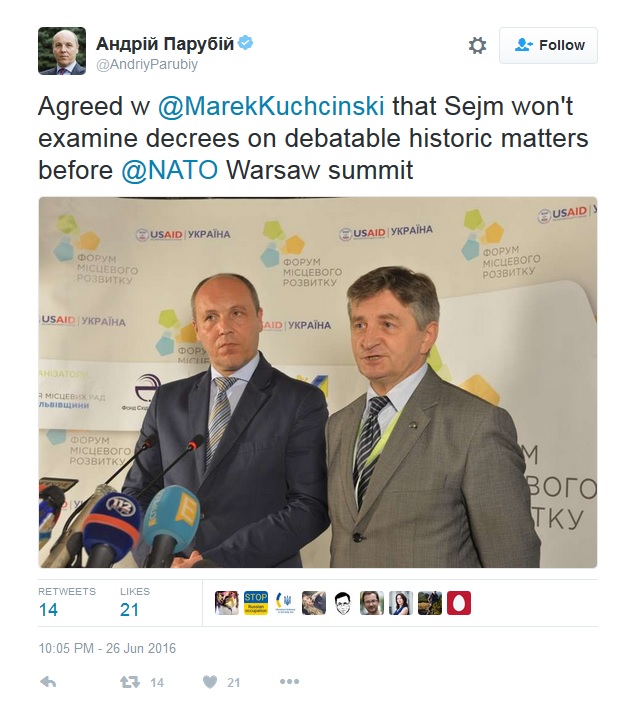Every July Poland is rocked by internal debates about Ukraine’s historical responsibility for the 1943 Volhynia massacre, and 2016 is no exception.
The ruling Law and Justice party (PiS) of Jarosław Kaczyński came to power mainly on promises to raise the topic of the massacre of the Polish population of Volhynia during the WWII by the butchers from the Ukrainian Insurgent Army (UPA) in Kiev. «The crimes committed against our compatriots by the UPA should be termed genocide. I will not permit any excuses for what happened during the most terrible era in our history», exhorted Jarosław Kaczyński during the heat of the election campaign.
However, his actions never went beyond promises. Like its predecessors in the Civic Platform party, the PiS refuses to declare July 11 as Kresy Martyrdom Remembrance Day. (Kresy is the name for the region of western Ukraine, western Belarus, and Lithuania that was once part of the Second Polish Republic. On July 11, 1943, at the height of a wave of violence committed by the UPA, 100 Polish villages and farmsteads were attacked by Stepan Bandera’s gangs.)

Instead of commemorating July 11, Jarosław Kaczyński proposes to move Martyrdom Day to Sept. 17 (Sept. 17, 1939 was the day the Red Army launched its Polish campaign, returning of western Ukraine and western Belarus, respectively, to the Ukrainian and Byelorussian Soviet Socialist Republics).
The state-run Polish Press Agency (Polska Agencja Pracowa – PAP) has joined in these efforts to distort the historical record. In order to subdue anti-Banderite tensions among the Polish public, one story published by the press agency called the UPA militants who were killed in clashes with the Polish army near the village of Bircza in 1946 as «Ukrainian war heroes» (bohaterów wojennych).
Sejm deputy from Przemyśl Wojciech Bakun sent the PAP a formal request to clarify what kind of war took place near Bircza in 1946 that had produced those «Ukrainian war heroes». The PAP formally responded that it was not possible to retract or edit the text of the report.
And then an information bomb exploded.
The chairman of Ukraine’s Verkhovna Rada, Andriy Parubiy, tweeted about a meeting he had had with the chairman of the Polish Sejm Marek Kuchciński. The leader of Poland’s parliament promised that the Sejm would not debate the bill to commemorate the victims of the Volyn massacre prior to the NATO summit in Warsaw on July 8-9.

The fallout was all the more deafening because one of the participants in the negotiations was Yuriy Shukhevych – the son of the chief culprit in the massacre of the Poles in Volhynia, the UPA commander Roman Shukhevych. Although the Polish mainstream media have kept silent about Kuchciński’s negotiations with Parubiy and Shukhevych Jr., the Kukiz’15 and Right Wing of the Republic party leaders demanded that Banderite ideology be banned in Poland and urged Kuchciński to resign.
Tadeusz Isakowicz-Zaleski, a Polish Roman and Armenian Catholic priest and author of Subdued Genocide in Kresy 2008 documentary book, has called upon the public to protest the PiS policies that maliciously distort history. «Contrary to previous assurances, the leaders of the PiS have again deferred a vote to pay tribute to the memory of the citizens of the Second Republic who were killed during the Banderite genocide in the Eastern Kresy region… This postponement of the voting procedure is yet another blow to the families of the victims of the UPA and the SS Galicia Division… I urge everyone who is affiliated with the Kresy to protest at the Sejm building on July 7 at 1:00 pm».
The very next day the PiS tried to get a jump on events. «I am opposed to reopening wounds… If I were Isakowicz-Zaleski I would have lowered the bar. If we want to have a talk with someone we shouldn’t set preconditions from the start», commented Stanisław Karczewski, the chairman of the Polish Senate, about the priest’s anti-Banderite initiative. But it was too late. A number of Polish parliamentarians had already posted videos supporting the idea of staging a protest at the door of the Sejm.
The very fact that negotiations were held between representatives of the Polish government and Ukrainian nationalists shows the desire of the ruling Law and Justice party to divert the public’s attention away from the subject of the Volhynia massacre as an act of genocide and to take the heat off Ukrainian nationalism as an ideology. This is a direct betrayal by the PiS of its voters.
If Sept. 17 is declared as a remembrance day instead of July 11, then eventually Poles will begin to approve of the crimes committed by the Ukrainian cutthroats, just like today many Japanese believe that Washington was correct in its decision to have the US Air Force drop nuclear bombs on Hiroshima and Nagasaki.
The Volhynia massacre was an «atomic bomb» for Poland. By 1950, over 140,000 Japanese had died as a result of the 1945 US nuclear bombardment and its aftermath. The UPA militants slaughtered approximately the same number of Poles.
As the incumbent Polish leaders see Ukrainian nationalism as its strategic ally, the first victim of this policy will be the Polish people and its national conscience.
RELATED VIDEO:









